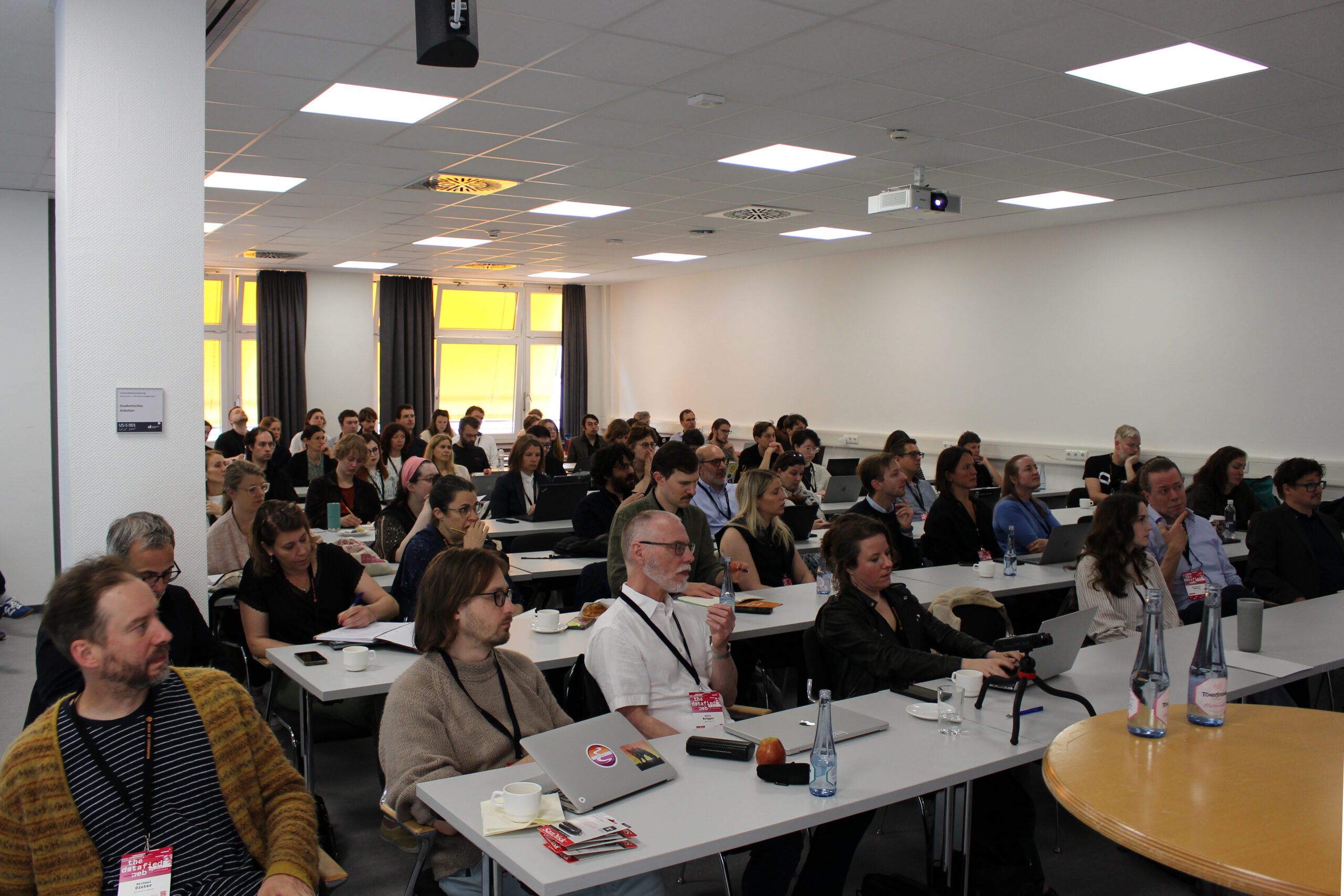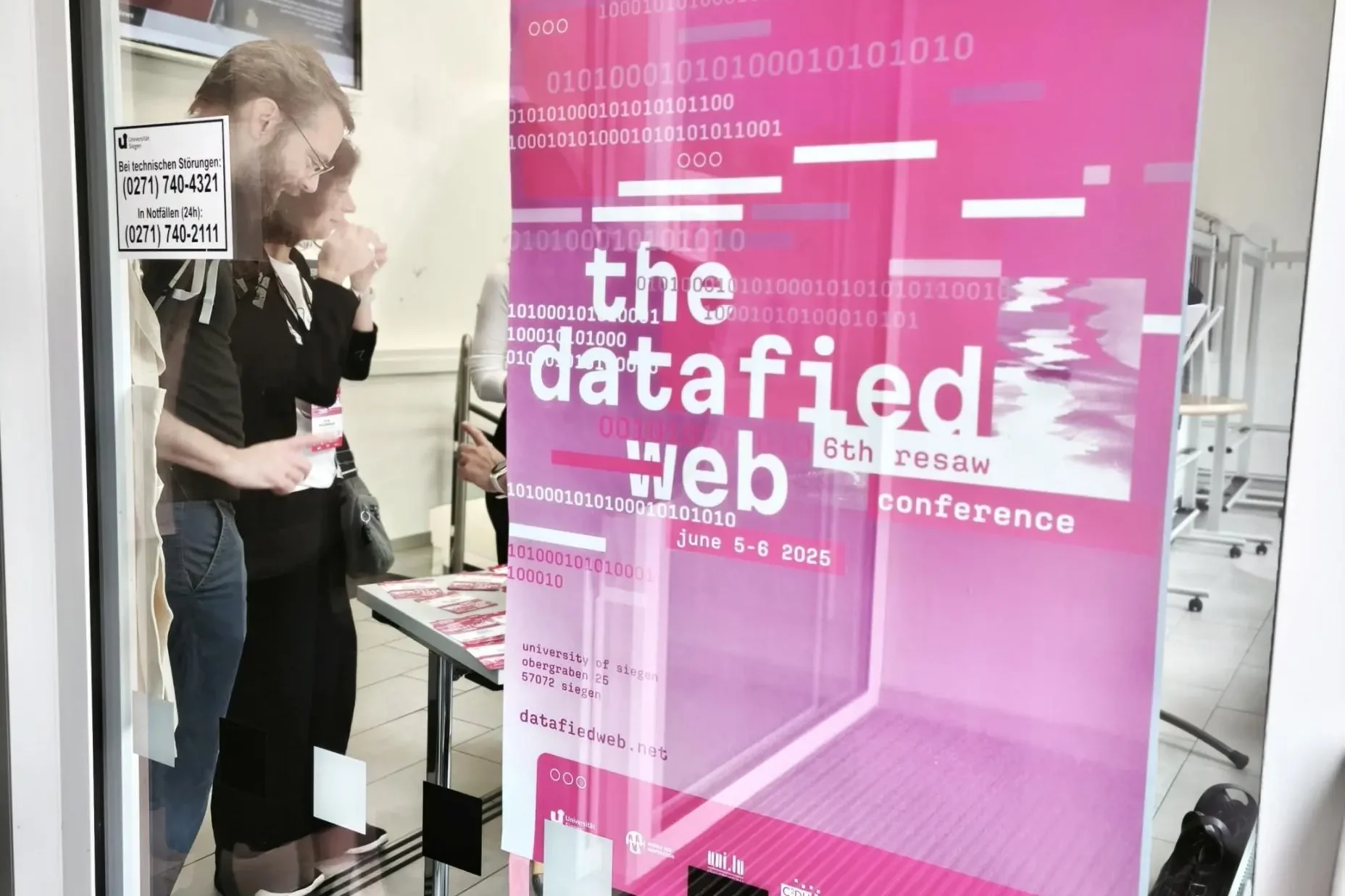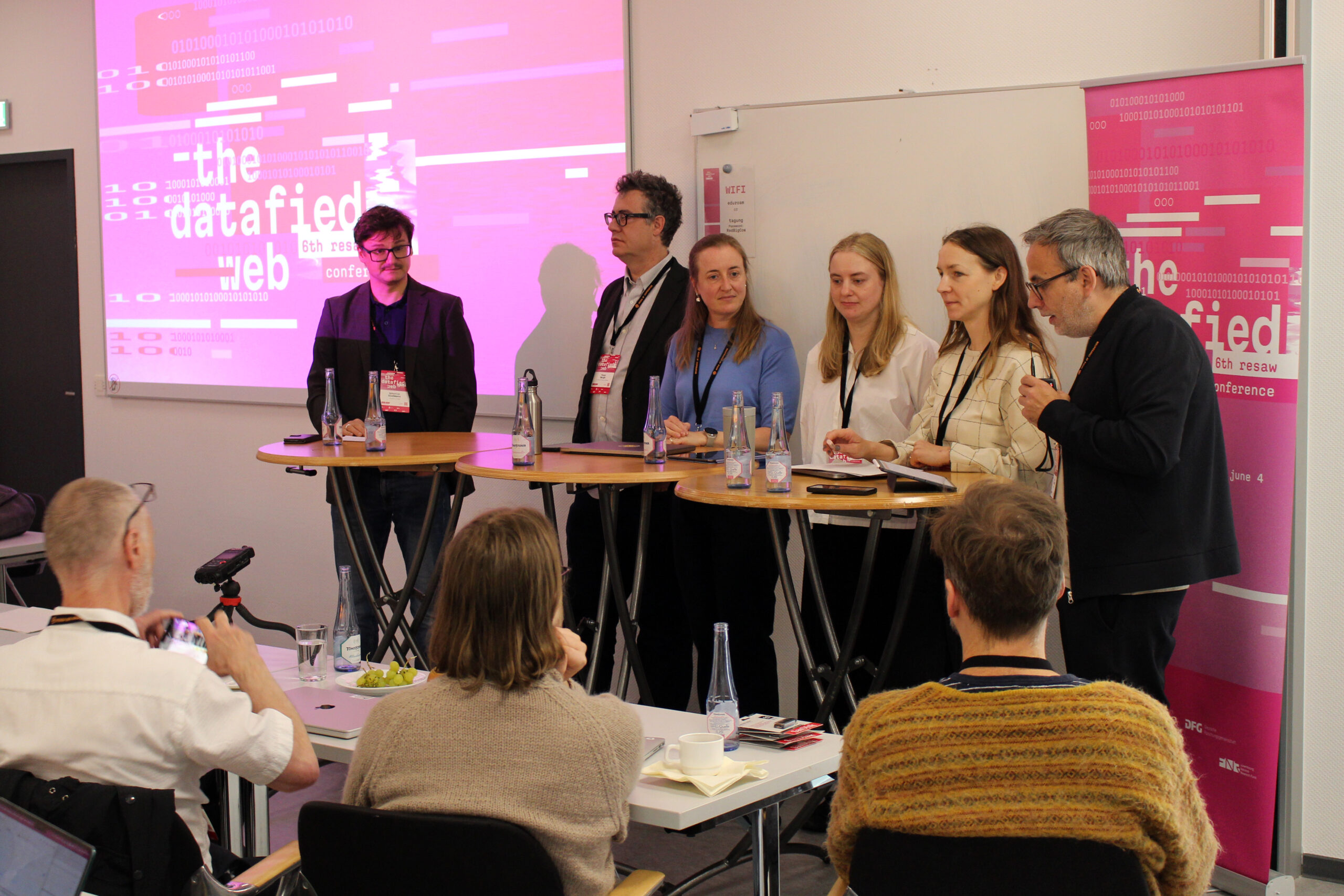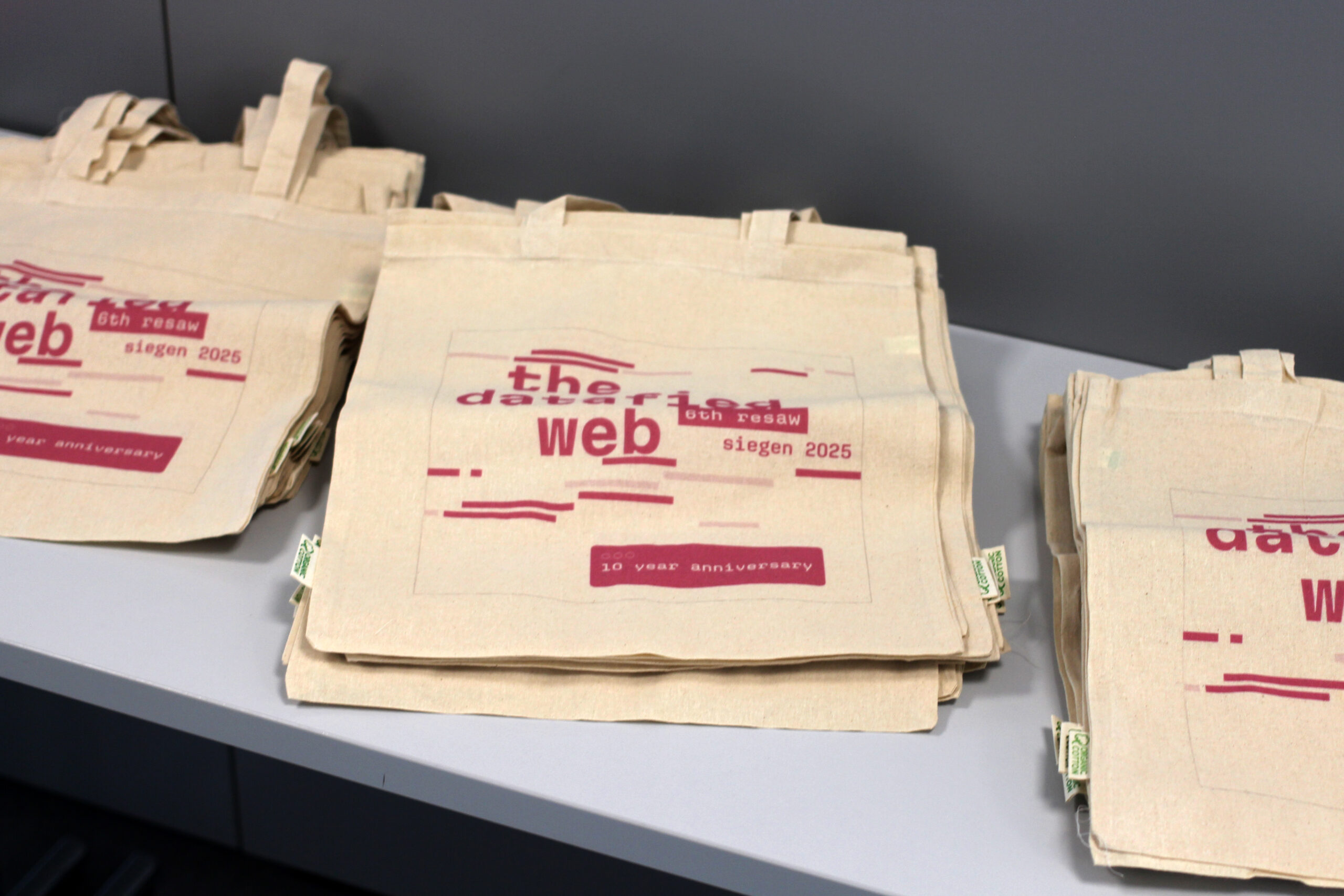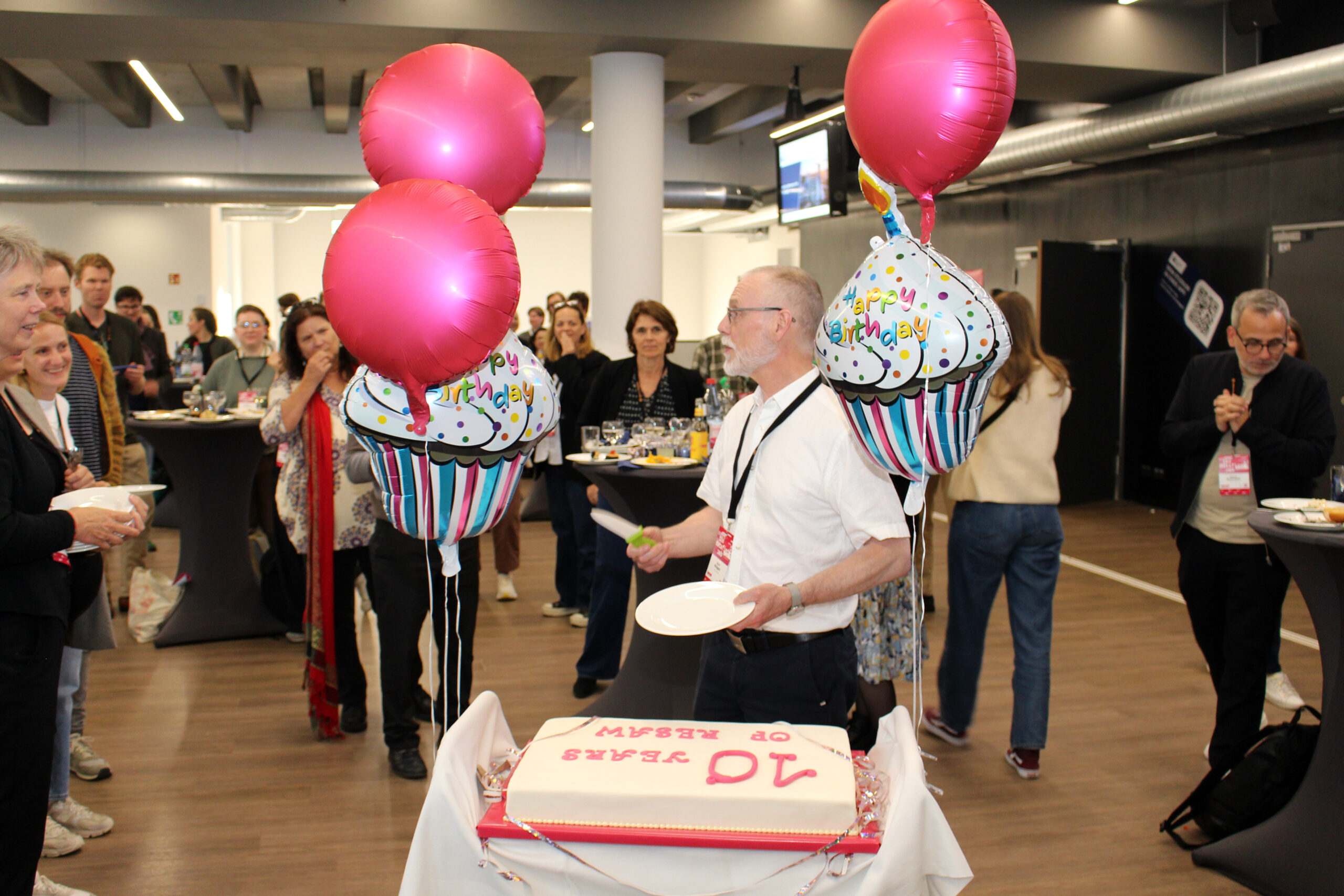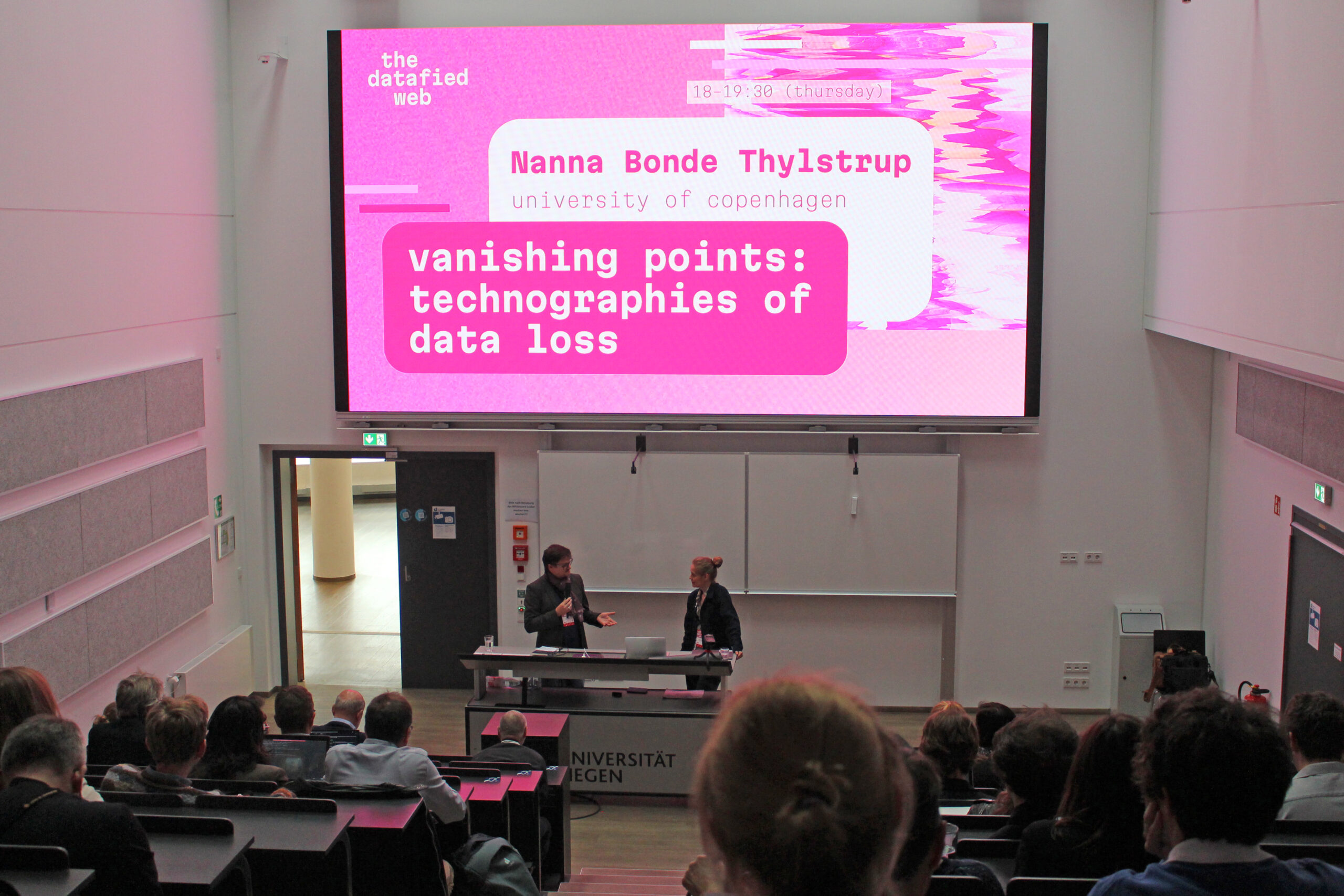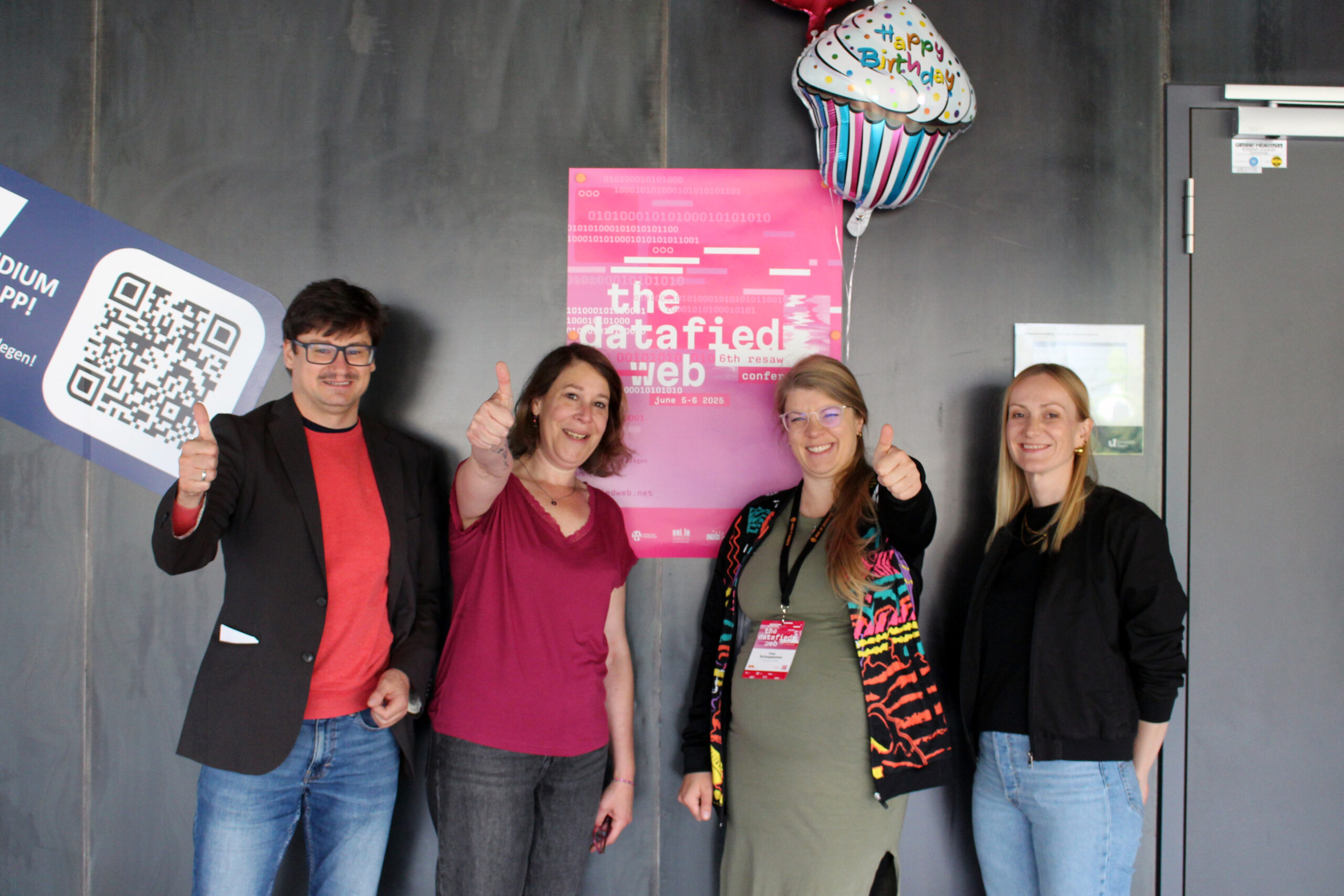Neuigkeiten
Research on AI, Big Data Processing & Synthetic Media
The CRC “Media of Cooperation” launches its Critical Data School initiative at the University of Siegen with the international Autumn School “Synthetic Imaginaries: The Cultural Politics of Generative AI”.
The rise of artificial intelligence (AI), big data processing, and synthetic media has profoundly reshaped how culture is produced, made sense of, and experienced today. To ‘synthesize’ is to assemble, collate, and compile, blending heterogeneous components into something new. Where there is synthesis, there is power at play. Synthetic media—as exemplified by the oddly prophetic early speech synthesizer demos—carry the logic of analog automation into digital cultures where human and algorithmic interventions converge. Much of the research in this area—spanning subjects as diverse as augmented reality, avatars, and deepfakes—has revolved around ideas of simulation, focusing on the manipulation of data and content people produce and consume. Meanwhile, generative AI and deep learning models, while central to debates on artificiality, raise political questions as part of a wider social ecosystem where technology is perpetually reimagined, negotiated, and contested: What images and stories feed the datasets that contemporary AI models are trained on? Which imaginaries are reproduced through AI-driven media technologies and which remain latent? How do synthetic media transform relations of power and visibility, and what methods—perhaps equally synthetic—can we develop to analyze these transformations?
About the Autumn School
The five-day event at the University of Siegen explores the relationship between synthetic media and today’s imaginaries of culture and technology, which incorporate AI as an active participant. By “synthetic,” we refer not simply to the artificial but to how specific practices and ways of knowing take shape through human-machine co-creation. Imaginaries, in turn, reflect shared visions, values, and expectations—shaping not only what technologies do but how they are perceived and made actionable in everyday life.
Event Highlights
The five-day event features three keynotes and opens with a conference that brings together a total of six panels with contributions by scholars from Hong Kong, Norway, Australia, Germany, Austria, Romania, Slovenia, Spain, Taiwan, and the UK.
Our keynotes
- “Synthetic Narration: Do AI-generated stories flatten cultural diversity?” by Jill Walker Rettberg (Center for Digital Narrative, University of Bergen)
- “Synthetic situations: Ethnographic strategies for post-artificial worlds” by Gabriele de Seta (Center for Digital Narrative, University of Bergen)
- “Design Research with visual generative AI: failures, challenges, and research pathways” by Ángeles Briones (DensityDesign Lab, Politecnico di Milano)
From the second day onwards, the Autumn School moves into hands-on workshops and project work facilitated by a team of interdisciplinary scholars and data designers.
Mix questions! Monday, 8 September
Day one opens space for emerging questions—think of it as an idea hub. The panels explore diverse topics, from identities and digital narratives to platforms, infrastructures, and the politics of AI. The discussion-focused format invites participants to pose questions, share concepts, and highlight methodological challenges in an open exchange, rather than focusing on individual presentations.
Mix methods! Tuesday, 9 September-Thursday, 11 September
The next three days are about exploring new methods—hands-on! Each of our project teams will present a research question alongside a specific method to be collaboratively explored. Participants will not only learn how to design prompts and work with AI-generated text and images, but also how to critically account for genAI models as platform models. All projects draw on intersectional approaches, combining qualitative and quantitative data to explore the synthetic dimensions of AI agency—with contributions by Gabriele De Seta (University of Bergen), Marcus Burkhardt (University of Paderborn), Hendrik Bender (University of Siegen), Marloes Geboers (University of Amsterdam), Elena Pilipets (University of Siegen), Riccardo Ventura (Politecnico di Milano), Andrea Benedetti (Politecnico di Milano), Ángeles Briones (Politecnico di Milano), Carolin Gerlitz (University of Siegen), Sara Messelaar Hammerschmidt (University of Siegen), Jill Walker Rettberg (University of Bergen).
Synthesize! Friday, 12 September
The final day is dedicated to sharing, reflecting, and synthesizing the questions, methods, and insights developed throughout the week. Project teams will present their collaborative processes, highlight key takeaways, and discuss how their ideas and approaches shifted through hands-on experimentation with methods.
The Autumn School is organized by the DFG-funded Collaborative Research Centers Media of Cooperation (SFB 1187) and Transformations of the Popular (SFB 1472) together with the Center of Digital Narrative in Bergen, the Digital Culture and Communication Section of ECREA and the German National Research Data Infrastructure Consortium NFDI4Culture.

STELLENAUSSCHREIBUNG:
Du bist interessiert, organisiert und hast Lust, in einem kleinen Team in die spannende und abwechslungsreiche Welt der wissenschaftlichen Arbeit einzutauchen? Veranstaltungen mitzugestalten und bei der Datenerhebung mitzuwirken klingt nach deinem Ding und du möchtest Wissenschaft online und offline erlebbar machen? Dann suchen wir genau dich!
SHK/WHB-Stelle im SFB-Teilprojekt A04 „Normale Betriebsausfälle. Struktur und Wandel von Infrastrukturen im öffentlichen Dienst“
Im DFG-Sonderforschungsbereich 1187 „Medien der Kooperation“ suchen wir eine studentische Hilfskraft (SHK) oder eine wissenschaftliche Hilfskraft mit Bachelor-Abschluss (WHB) für das Teilprojekt A04 „Normale Betriebsausfälle. Struktur und Wandel von Infrastrukturen im öffentlichen Dienst“ des zum
1. November 2025 zu folgenden Konditionen:
- 9 Stunden/Woche
- zunächst für 1 Jahr, mit der Möglichkeit einer Verlängerung
- Beschäftigung auf Grundlage des Wissenschaftszeitvertragsgesetzes
Was dich bei uns erwartet:
- Sozial- und Medienwissenschaften praxisnah: Du interessierst dich für Themen der Mobilität, Nachhaltigkeit und den Wandel unserer Gesellschaft. Deine Mithilfe bei der Recherche von passender Literatur, der Aufbereitung und Auswertung von Forschungsdaten ist gefragt.
- Hands-on bei Events: Deine Ideen und Hände sind gefragt. Hilf mit bei der Organisation und Durchführung öffentlicher Veranstaltungen, z.B. Workshops und Tagungen.
Was du mitbringen solltest:
- Du bist in Sozialwissenschaft oder Medienwissenschaft mit sozialwissenschaftlichen Schwerpunkt immatrikuliert.
- Du hast Spaß daran, Dinge zu organisieren und an Forschung mitzuwirken.
- Du arbeitest strukturiert, bist eigenständig und verantwortungsbewusst.
Was wir dir bieten:
- Ein motiviertes, nettes Team und eine entspannte Arbeitsatmosphäre.
- Flexible Arbeitszeiten und Homeoffice-Möglichkeit – damit Uni und Job zusammenpassen.
- Spannende Einblicke in die Projektarbeit und Wissenschaftsorganisation.
Klingt gut? Dann schick uns eine kurze Bewerbung bis zum 12.09.2025 und zeig uns, warum du perfekt in unser Team passt. Sende deine Bewerbungsunterlagen (kurzes Motivationsschreiben, Lebenslauf, ggf. Arbeits- und/oder Studienzeugnisse) in einer pdf-Datei an Damaris Lehmann (damaris.lehmann[ae]uni-siegen.de). Wir freuen uns darauf, dich kennenzulernen.
Deine Ansprechperson:
Damaris Lehmann
damaris.lehmann[ae]uni-siegen.de
Über die Triebkräfte der vierten industriellen Revolution
Digitale Zwillinge stehen für das techno-ideologische Paradigma unserer Zeit. Die neue Sonderausgabe befasst sich mit Praktiken, Theorien, Technologien und der Geschichte des „Digital Twinnings“ aus verschiedenen Disziplinen. Alle Beiträge sind frei zugänglich.
Über die Sonderausgabe
Digitale Zwillinge sind derzeit die wichtigsten Treiber der vierten industriellen Revolution. Immer komplexere technische Produkte und Prozesse werden heute zunächst in der virtuellen Welt entwickelt und getestet, bevor sie in der „realen“ Welt zum Einsatz kommen. Zukünftige Artefakte und Praktiken werden zunächst als Softwaremodelle erstellt und als digitale Zwillinge simuliert. Die Verbreitung digitaler Zwillinge in Industrie und Forschung führt zu einem grundlegenden Paradigmenwechsel in den digitalen Medientechnologien. Das Digitale ist weder eine Echtzeit-Virtualisierung eines realen physischen Objekts noch ein völlig separates Objekt: Es ist viel mehr, denn es ermöglicht die Analyse zukünftiger Leistungen von Objekten, ohne dass diese Objekte physisch vorhanden sein müssen.
Digitale Zwillinge repräsentieren das techno-ideologische Paradigma unserer Zeit. Sie haben ihr eigenes Ethos im Kontext einer technokratischen Weltanschauung, die davon ausgeht, dass alles, was beobachtbar oder zumindest wahrnehmbar ist, auch zählbar, verantwortlich und berechenbar gemacht werden kann. Während sich das „Digital Twinning“ ursprünglich nur auf technische Systeme bezog, werden heute auch andere Parameter vorhergesagt, wie beispielsweise menschliche Bewegungsmuster und gelegentlich auch soziale Aspekte. Digitale Zwillinge sind somit symbolisch und paradigmatisch für eine technokratische Weltanschauung, die von der Überzeugung geprägt ist, dass alles berechnet und kontrolliert werden kann. Digitale Zwillinge sind technopolitische Artefakte oder vielmehr von einer Technoökologie geprägt, da sie zunehmend in institutionelle Entscheidungsprozesse eingebunden sind, die letztlich uns alle betreffen können. In diesem Zusammenhang entfalten digitale Zwillinge ihre wahre Macht.
Christoph Borbach, Wendy H.K. Chun und Tristan Thielmann nutzten diese Situation als Gelegenheit, um gemeinsam eine Sonderausgabe von New Media & Society zum Thema „Digital Twinning” herauszugeben. Die Sonderausgabe ist nun online verfügbar, wobei die meisten Beiträge frei zugänglich sind. Ihr gemeinsam verfasster Leitartikel „Making everything ac-count-able: The digital twinning paradigm” ist hier zu finden.
Diese Sonderausgabe enthält eine Reihe hervorragender und aufschlussreicher Beiträge von Autoren wie Louise Amoore, Jussi Parikka, Orit Halpern, John S. Seberger & Geoffrey C. Bowker, Oliver Dawkins & Rob Kitchin und vielen anderen. Insgesamt enthält die Ausgabe 14 Artikel, die sich mit Praktiken, Theorien, Technologien und der Geschichte des „Digital Twinning“ aus verschiedenen Disziplinen unter Verwendung unterschiedlicher Methoden befassen.
Einige der Beiträge stehen im Zusammenhang mit der Jahreskonferenz 2023 des SFB 1187 zum Thema „Digitale Zwillinge und Doppelgänger. Daten der Kooperation”.
Informationsveranstaltungen zur Einführung der elektronischen Patientenakte
Im Rahmen einer Informations- und Diskussionsveranstaltung haben Forscher*innen der Universität Siegen über die Nutzung der elektronischen Patientenakte aufgeklärt. Neben der Bereitstellung von allgemeinen Informationen boten sie Bürger*innen Gelegenheit, offene Fragen und Bedenken rund um das Thema zu diskutieren.
Über die Veranstaltung
In Kooperation mit dem Digitalen Facharzt- und Gesundheitszentrum (DFGZ) der Arztpraxis „Spieren & Kollegen“ führte das Teilvorhaben 4 „Gesundheit und Altern“ des Forschungsprojekts FUSION zusammen mit dem Teilprojekt des SFB A05 „Kooperative Herstellung von Nutzerautonomie im Kontext der alternden Gesellschaft“ bereits zwei Informations- und Diskussionsveranstaltungen zur Einführung der elektronischen Patientenakte (ePA) durch. Das zentrale Anliegen der Beteiligten ist dabei, die Hürden bei der Nutzung der ePA für Bürgerinnen und Bürger abzubauen und den Wissenstransfer unter den Arztpraxen in Südwestfalen zu unterstützen. Neben der Bereitstellung von allgemeinen Informationen zur elektronischen Patientenakte boten die Veranstaltungen daher auch Gelegenheit, offene Fragen und Bedenken rund um das Thema zu diskutieren.
Claudia Müller, Leiterin der beiden Forschungsprojekte, äußerte sich dazu, dass man natürlich mit solchen Veranstaltungen kein Massenpublikum erreiche, aber die Hoffnung habe, dass zahlreiche der über 100 Teilnehmerinnen und Teilnehmer der beiden ePA-Veranstaltungen als Multiplikatoren fungieren werden. Eine Herausforderung besteht darin, dass nicht jede Person gleichermaßen die Fähigkeiten oder technischen Möglichkeiten mitbringe, um die elektronische Patientenakte tatsächlich selbst nutzen zu können. Dies sei zwar kein spezifisches Problem der ePA, müsse aber in Zeiten zunehmender Digitalisierung und Online-Angeboten berücksichtigt werden, so Müller weiter.
Dennis Kirschsieper, Mitarbeiter im Teilporjekt A05 des SFB, und Dr. Stephan Krayter, Mitarbeiter im FUSION-Projekt, haben das Projekt von Anfang an betreut und erläutern dazu:
„Es ist üblich, dass es bei der Einführung neuer Technologien Personen gibt, die diese direkt mit Neugier ausprobieren und nutzen – sogenannte ‚Technikpioniere‘ oder ‚Frühanwender‘ – und solche, die sich dem Neuen zögerlicher zuwenden, erst einmal bei anderen schauen und abwarten. Mit der Bereitstellung der Erfahrungen der Frühanwender tragen wir dazu bei, den Einstieg in die elektronische Patientenakte für andere zu vereinfachen.“
Kommende Interviewstudie: Aufruf zur Teilnahme
Nach der erfolgten Einführung der ePA geht es nun vor allem darum, den Austausch bei Problemen mit der elektronischen Patientenakte zu unterstützen und die Einführung sowie die tatsächliche Nutzung der ePA durch die Bürger*innen mittels einer qualitativen Interviewstudie zu begleiten.
Hierfür ruft das Forschungsteam zur Teilnahme auf. Ziel der Studie ist, die Erfahrungen der Nutzer*innen mit der elektronischen Patientenakte zu sammeln und wissenschaftlich auszuwerten.
Bei Interesse an einer Teilnahme an der Interviewstudie, wenden Sie sich gerne per Mail oder Telefon an
Dennis Kirschsieper: dennis.kirschsieper[æt]uni-siegen.de oder 0271 / 740-2002
Dr. Stephan Krayter: stephan.krayter[æt]uni-siegen.de oder 0271 / 740-3833
Interesse an Tätigkeit im wissenschaftlichen Umfeld?
Im Teilprojekt B06 „Un/erbetene Beobachtung in Interaktion: Smart Environments, Sprache, Körper und Sinne in Privathaushalten“ des DFG Sonderforschungsbereichs 1187 „Medien der Kooperation“ suchen wir eine studentische Hilfskraft (SHK) (m/w/d) zum 01. August 2025 zu folgenden Konditionen:
- Bis zu 10 Wochenstunden (genaue Stundenzahl nach Vereinbarung)
- Zunächst befristet für ein Jahr, mit der Möglichkeit zur Verlängerung
- Beschäftigung auf Grundlage des Wissenschaftszeitvertragsgesetzes
Ihre Aufgaben:
- Aufbereitung und Transkription von Feldnotizen sowie Teilnahme an der Auswertung des Datenmaterials
- Unterstützung bei Zuarbeit für die Forschung (u.a. Literaturrecherche und -verwaltung)
- Unterstützung bei der Durchführung von Veranstaltungen (u.a. in der Planung und praktischen Durchführung von Tagungen und Workshops)
- Mithilfe bei der Erstellung wissenschaftl. Publikationen (z.B. Korrektorat, Formatierungsarbeiten) )
Ihr Profil:
- Vorteilhaft ist die Vertrautheit mit empirischem Arbeiten
- Bereitschaft für flexible Arbeitszeiten
- Immatrikulation in einem (bevorzugt sozial- oder medienwissenschaftlichen) Bachelor- oder Master-Studiengang an einer deutschen Hochschule (bevorzugt Uni Siegen)
- Interesse an einer Tätigkeit im wissenschaftlichen Umfeld
- Strukturiertes Arbeiten, Freude an Teamarbeit, Eigeninitiative und Verantwortungsbewusstsein
→ vollständige Stellenausschreibung
Wir freuen uns auf Ihre Bewerbung bis zum 21.07.2025.
Bitte senden Sie Ihre Bewerbungsunterlagen (Anschreiben, tabellarischer Lebenslauf, Zeugnisse) in einer einzigen pdf-Datei an Herrn Strüver.
Weitere Infos zu dem Projekt erhalten Sie hier: https://www.mediacoop.uni-siegen.de/de/projekte/b06/
Ihre Ansprechperson:
Niklas Strüver, M.A.
niklas.struever[æt]uni-siegen.de
Zum vortechnologischen Medienbegriff
von Erhard Schüttpelz (Universität Siegen/SFB)
Wenn wir schon immer in einer Mediengesellschaft leben, was sind Medien dann wirklich? Erhard Schüttpelz geht dieser Frage in seinem neu erschienenen Buch Medium, Medium nach.
Über das Buch
Der Begriff des Mediums fällt heutzutage oft im Zusammenhang mit Technologie, dabei gibt es Medien schon länger in anderer vermittelnder Rolle zwischen Menschen und Nicht-Menschen. Schüttpelz verschiebt mit dieser Studie die Perspektive der Medienwissenschaften und stellt sich der Frage, was Medien überhaupt sind.
Verlagstext:
Wer an Medien denkt, hat meist ihre Ausformung in technischen Apparaten vor Augen, vom ersten Telegrafen bis zu den heutigen Kommunikations- und Speichermedien. Dabei gerät außer Acht, dass dem Begriff des Mediums auch eine schon vor der Technologie existierende Bedeutung zukommt, in der es jene bezeichnet, die zwischen Himmel und Erde, zwischen Lebenden und Toten, zwischen An- und Abwesenden vermitteln können. Wenn sich Medialität über Jahrtausende als Praxis fassen lässt, die Menschen und Nicht-Menschen verbindet, findet in der Moderne ein Bruch statt: Medien fallen mit Technologie in eins, und aus einer vielfältigen Fremdheit der Medien wird ein Wechselspiel von Prothese und Fernbedienung.
In seiner bahnbrechenden Studie verschiebt Erhard Schüttpelz die Perspektive der Medienwissenschaften: von der Waffe zum Behältnis, von der Schrift zur Sprache, von der Magie zum Ritual. Und er stellt die Frage, was Medien tatsächlich sind, wenn wir immer schon in Mediengesellschaften gelebt haben.
Über den Autor
Erhard Schüttpelz ist nach dem Studium der Germanistik, Anglistik, Ethnologie in Hannover, Exeter und Bonn und Forschungstätigkeiten in Oxford, Köln, New York, Konstanz und Wien seit 2005 Professor für Medientheorie an der Universität Siegen. Am SFB leitet er aktuell das Teilprojekt P02 „Medien der Praxeologie II: Anthropologie der Kooperation: Skill, Deixis, Wechselwirkung“.
Wie verändern sich alltägliche Haushaltspraktiken durch intelligente, sensorbasierte Medientechnologien?
von Tim Hector, Niklas Strüver, Stephan Habscheid und Dagmar Hoffmann (alle Universität Siegen, SFB)
In unserem neuen Working Paper (No. 36) präsentieren Tim Hector, Niklas Strüver, Stephan Habscheid und Dagmar Hoffmann erste Ergebnisse ihrer interdisziplinären Pilotstudie zur Gestaltung von Haushaltsökologien und -prozessen durch Smart Home Geräte. Die Studie ist Teil ihres Forschungsprojekts am SFB, in dem die Autor/innen gemeinsam die Domestizierung smarter Technologien als einen Fall kooperativer Produktion von Medien und Daten untersuchen.
Über das Working Paper
Das Working Paper präsentiert als Proof of Concept erste Ergebnisse einer interdisziplinären Pilotstudie, die mit Methoden der soziologischen und linguistischen Medienforschung der Frage nachgeht, wie sich alltägliche Haushaltspraktiken mit intelligenten, sensorbasierten Medientechnologien, die als multimodale Interaktionen beobachtet werden können, darstellen und verändern. Im Kontext des Projekts „B06 – Un-/erbetene Beobachtung in Interaktion: Smart Environments, Sprache, Körper und Sinne in Privathaushalten“ im Sonderforschungsbereich (SFB) „Medien der Kooperation“ wird die Domestizierung smarter Technologien als ein Fall der kooperativen Produktion von Medien und Daten – mit und ohne Konsens (Star und Griesemer 1989) – erforscht. Der Fokus der vorgestellten Pilotstudie liegt auf Mensch-Maschine-Kooperationen, bei denen eine mehr und minder bemerkte Erfassung von Verhaltens- und Umweltdaten durch Sensoren zur halbautomatischen Gestaltung von Haushaltsökologien und -prozessen beiträgt. Wir rekonstruieren und untersuchen Formen der Interaktion bzw. Kommunikation mit Interfaces dieser modernen Technologien und die sensorischen Orientierungen sowie körperlichen Praktiken der Nutzer*innen. Weiterhin von Interesse sind die räumlichen und materiellen Anordnungen, die für das soziale und kommunikative Arrangement sowie die Zweckmäßigkeit und Zielgerichtetheit des soziotechnischen Handelns mit den Geräten wesentlich sind. In dem vorliegenden Working Paper präsentieren wir explorative mediensoziologische und medienlinguistische Analysen einer mit smarten Geräten ausgestatteten Wohnumgebung sowie exemplarisch des Umgangs mit zwei Geräten: einem Amazon Echo Show (10. Gen.), das ist ein sich drehender Smart Speaker mit Voice User Interface, Kamera, Display, Video-/Touch Screen und kamerabasierter Bewegungserkennung, sowie einem smarten AirFryer, das ist eine Heißluftfritteuse mit Internetverbindung. Die Untersuchung zeigt, dass die Nutzer*innen mit ihrem menschlichen Sensorium, d.h. sowohl sozial-kognitiv als auch leiblich-körperlich, in die Mensch-Maschine-Interaktion eingebunden und in situ herausgefordert sind, verschiedene Entscheidungen zu treffen.
Über die Autor/innen
Tim Hector (Dr. des.) ist wissenschaftlicher Mitarbeiter im SFB 1187 „Medien der Kooperation“ an der Universität Siegen im Projekt B06 („Un/erbetene Beobachtung in Interaktion“). In seiner Promtoion hat er sich mit Smart Speakern im Gespräch beschäftigt. Zu seinen Forschungsinteressen zählen u.a. die Medienlinguistik, die Gesprächsforschung sowie die linguistische Praxeologie. Niklas Strüver (M.A.) ist wissenschaftlicher Mitarbeiter im Projekt B06 („Un/erbetene Beobachtung in Interaktion“) und Doktorand am SFB 1187 „Medien der Kooperation“. Er studierte Soziologie mit einem Schwerpunkt auf Techniksoziologie an der RWTH Aachen und schloss dort den Master of Arts ab. Seine Forschungsschwerpunkte liegen u.a. in den Bereichen Techniksoziologie, Science and Technology Studies sowie Platform Studies.
Stephan Habscheid (Prof. Dr.) ist Professor für Germanistik / Angewandte Sprachwissenschaft an der Universität Siegen. Im SFB 1187 „Medien der Kooperation“ leitet er gemeinsam mit Dagmar Hoffmann das Projekt B06 („Un/erbetene Beobachtung in Interaktion“). Er forscht u.a. zur Medienlinguistik und einer linguistischen Praxeologie sowie zu Sprache in Institutionen und Organisationen. Dagmar Hoffmann (Prof. Dr.) ist Professorin für Medien und Kommunikation / Gender Media Studies an der Universität Siegen. Im SFB 1187 „Medien der Kooperation“ leitet sie seit 2020 gemeinsam mit Stephan Habscheid das Projekt B06 („Un/erbetene Beobachtung in Interaktion“). Sie arbeitet u.a. zu digitalen Kompetenzen, Mediensozialisation und -aneignung sowie zu Bild- und Medienpraktiken im Social Web.
Über die Working Paper Reihe
Die Working Paper Series des SFB 1187 „Medien der Kooperation“ versammelt aktuelle Beiträge aus dem Umfeld der inter- und transdisziplinären Medienforschung. Die SFB Working Paper Series bietet die Möglichkeit einer Vorveröffentlichung und schnellen Verbreitung von am SFB laufenden oder ihm nahestehenden Forschungsarbeiten. Ziel der Reihe ist es, die SFB-Forschung einer breiteren Forschungsgemeinschaft zugänglich zu machen. Die Veröffentlichung in der Working Paper Series schließt die Publikation überarbeiteter Versionen desselben Beitrags in anderen Zeitschriften nicht aus. Beiträge von Postdocs und etablierten Wissenschaftlicher*innen werden begrüßt. Die Reihe versteht sich als Publikationsforum für die im SFB vertretenen Wissenschaftler*innen, Projekte und ihre laufende Forschung. Die Beiträge erscheinen im Open Access und in limitierter Printauflage. Wenn Sie einen Beitrag in der Working Paper Series veröffentlichen möchten, reichen Sie bitte Ihren Themenvorschlag in Form eines Abstracts (max. 300 Wörter) zusammen mit einer Kurzvita (max. 50 Wörter) ein. Für die Manuskripteinreichung beachten Sie bitte unser Styleguide.
Gefördert durch die Deutsche Forschungsgemeinschaft (DFG) – Projektnummer 262513311 – SFB 1187. Redaktionelle Verantwortung: Karina Kirsten, Universität Siegen & SFB 1187 Medien der Kooperation.
The 2025 RESAW Conference: Data, Communities, and Food … for Thoughts
by Valérie Schafer (University of Luxembourg & CRC 1187)
The 2025 edition of the RESAW conference marked a significant milestone: the tenth anniversary of a vibrant and constantly evolving academic community. Since its inception in 2015, this conference series has brought together researchers, archivists, and practitioners from diverse fields concerned with the history and present of the web. This year’s event was memorable, not only because of the anniversary, but also due to the remarkable richness of the exchanges, the diversity of its participants, and the depth of the contributions. RESAW joined forces with the Collaborative Research Centre (CRC 1187) Media of Cooperation, both coming together to study The Datafied Web and to preserve its histories.
About the RESAW conference and community
RESAW is the acronym for A REsearch Infrastructure for the Study of Archived Web Materials. The RESAW community is dedicated to working with digital cultural heritage and gathers every two years at the eponymous RESAW conference. RESAW was founded in 2012 with the goal of building a collaborative European research infrastructure for studying and working with web materials while fostering knowledge exchange across Europe. This presents significant challenges for both research and the archiving of web-based information and objects.
RESAW 2025 – The datafied Web at the University of Siegen
The conference drew close to one hundred participants from across Europe and North America. Among them were long-standing members of the community – some of whom have attended every edition since the beginning, as well as many newcomers, and notably from the CRC team at the University of Siegen. This mix created a dynamic and productive atmosphere, with new ideas and connections flourishing. It provided intellectual renewal and disciplinary cross-pollination.
The central theme, The Datafied Web, acted as a powerful conceptual anchor, encouraging reflection on how datafication has been and is reshaping the web, our methods, and our understanding of digital studies and web archives.
While many presentations were directly aligned with the theme, the conference also remained open to a wide array of topics beyond the scope of datafication. This flexibility is a longstanding strength of the event, allowing space for discussions of current research developments, methodological experimentation, and new discoveries in the fields of web archiving and web studies. Contributions ranged from updates on national and international web archiving initiatives to exploratory studies in platform studies or qualitative and quantitative methods.
RESAW set out to trace how the datafied web became the sensory media environment we now inhabit. A web of predictive suggestion, of per-user variation, of AI-generated aesthetic and ephemeral interfaces. A web where “what you see” is a product of where you clicked, what you hovered, which model you unknowingly trained. To study this web—and to preserve its histories—that is where the research agendas of Resaw and MoC come together. (Carolin Gerlitz, spokesperson of the CRC 1187)
A significant number of talks examined The Datafied Web through historical perspectives. These included case studies on the evolution of technologies such as the CD-ROM and Bluetooth, and their interaction with or transition into web-based platforms, shedding light on the frictions and continuities involved. Others focused on pressing current concerns, such as data surveillance, algorithmic governance, and the political economy of web and platform infrastructures.
The datafication of the web has brought about a decisive transformation of capitalism – and capitalist economies have in turn datafied the World Wide Web. Our current platform economies are based on the historical development of cookies, web advertising, and the measurement of public data. (Sebastian Gießman, head of the conference)
The interdisciplinary character of the conference was particularly evident this year. Approaches drawn from Web and Platform Studies, the History of Technology, Archival Studies, Digital Humanities, and Critical Data Studies were all present, and in fruitful dialogue. This interdisciplinarity was reflected not only in the themes discussed, but also in the methods employed: from close analysis to distant and scalable reading, and from infrastructure-focused studies to content-based investigations. Such methodological diversity illustrates the richness of the field and the necessity of hybrid approaches to fully grasp the complexities of the web’s past, present and future.
The keynote addresses were among the highlights of the conference. Nanna Bonde Thylstrup’s keynote offered a historically grounded presentation on the theme of data loss, linking it to broader narratives of memory, preservation, and forgetting in the digital age. Jonathan Gray’s keynote, by contrast, was more oriented toward the present and near future, addressing the stakes of open data, and the role of researchers in shaping ethical and inclusive data practices.
Beyond the formal sessions, a variety of pre-workshops, social events, and targeted meetings enriched the experience. Early-career researchers were given space to receive feedback and engage in mentoring dialogues. Pre-conference workshops offered hands-on methodological training and collaborative problem-solving. Roundtables tackled timely and strategic questions, such as the future of our scholarly RESAW network, and the challenges of studying datafication in the opening roundtable. (A personal conference trip report by Lesley Frew that focuses on her experience and some of the sessions is also available).
Of particular note was the attention paid to the epistemological and methodological implications of working with web data. Whether focusing on the politics of web archiving, the limits of data transparency, or the possibilities of algorithmic critique, many sessions interrogated not only what we know, but how we come to know it and what remains excluded or erased in the process. Case studies drawn from diverse geographical, historical and linguistic contexts further enriched these discussions, reminding us of the web’s heterogeneity and the need for grounded, situated and reflexive perspectives.
In conclusion, the 2025 conference was more than just a commemoration of ten years of scholarly exchange and conferences. It was a powerful reaffirmation of the value of community, dialogue, and interdisciplinary collaboration in the face of a rapidly evolving digital landscape and more generally world. The themes explored, the connections made, and the questions raised will no doubt continue to inspire work in the years to come.
We would like to sincerely thank again all the local organisers, all the participants who made this edition such a success, as well as the DFG and FNR, the University of Siegen, the CRC Media of Cooperation, and the C2DH at the University of Luxembourg for their support to this event.
The 2025 RESAW conference was organized by the Collaborative Research Centre 1187 “Media of Cooperation” at the University of Siegen in cooperation with the Centre for Contemporary and Digital History (C²DH) at the University of Luxembourg. The conference is funded by the Deutsche Forschungsgemeinschaft (DFG, German Research Foundation) and the Luxembourg National Research Fund (FNR).
More
Press release by the University’s Press Office →
Conference report by Lesley Frew →
2 Kurzzeitstipendien am SFB zu vergeben
Der SFB vergibt wieder zwei Kurzzeitstipendien an Wissenschaftler*innen, die im Bereich digitaler Medien, Sensing und Sensorik, Datenpraktiken und KI forschen und Interesse an einer längerfristigen Zusammenarbeit mit dem SFB haben.
Kurzinformationen
- Stipendienbeginn: 1. Oktober 2025
- Laufzeit: 9-12 Monate
- Grundbetrag des Stipendiums: 1.365,- EUR (Höchstsatz der DFG)
- Sachkosten¬zuschuss und ggf. Kinderzulage werden zusätzlich gezahlt
Über den SFB 1187 „Medien der Kooperation“
Der SFB ist ein interdisziplinärer Forschungsverbund, bestehend aus 19 Teilprojekten und mehr als 60 Wissenschaftler*innen aus Medienwissenschaft, Ethnologie, Soziologie, Informatik, Linguistik, Ubiquitous Computing, Science and Technology Studies, Erziehungs-, Rechts- und Ingenieurswissenschaften.
Der SFB wird seit 2016 von der Deutschen Forschungsgemeinschaft (DFG) gefördert. Im Zentrum der Forschung steht die Entstehung, Gestaltung und Nutzung digitaler, datenintensiver Medien, die der SFB als kooperativ erarbeitete Kooperationsbedingungen versteht. In der ersten Förderphase (2016-2019) reagierte der SFB auf die Relevanz von sozialen Medien und Plattformen, in der zweiten Phase (2020-2023) standen datenintensive Medien und Datenpraktiken im Mittelpunkt. Die aktuelle dritte Phase (2024-2027) widmet sich dem Zusammenspiel von Sensormedien und Künstlicher Intelligenz.
Über das Kurzstipendienprogramm des SFB erhalten nationale und internationale Doktorand*innen die Möglichkeit, ihr Forschungsprojekt im SFB weiterzuentwickeln, beteiligte Forscher*innen der Teilprojekte kennenzulernen und sich mit diesen auszutauschen. Thematisch sollen die Forschungsprojekte der Stipendiat*innen im Umfeld der Teilprojekte des SFB angelegt sein, damit ihre Arbeit von den Projekten unterstützt werden kann. Organisatorisch sind die Stipendiat*innen dem integrierten Graduiertenkolleg (MGK) des SFB zugeordnet und profitieren von seinem strukturierten Qualifizierungskonzept. Der SFB bietet Stipendiat*innen ein internationales Umfeld für interdisziplinäre Medienforschung sowie ein umfassendes Veranstaltungsprogramm und Methodentraining u.a. im Bereich ethnografischer, digitaler, sensorbasierter, linguistischer sowie KI-basierter Methoden.
Nähere Informationen zu den Schwerpunkten und Teilbereichen des SFB finden Sie unter: https://www.mediacoop.uni-siegen.de.
Ihr Profil
- Einschlägiger, überdurchschnittlicher Studienabschluss in einer der am SFB beteiligten oder verwandten Disziplinen, bevorzugt in der Medien- und Kulturwissenschaft, Soziologie oder im Bereich der Sozio- oder Wirtschaftsinformatik, Human-Computer-Interaction oder Informationssysteme (Master, Magister, Diplom oder Lehramt/Staatsexamen Sek. II)
- Eigenes Forschungsvorhaben in einer der o.g. Disziplinen im Themenbereich des SFB. Idealerweise können Sie das Projekt einem der Teilbereiche des SFB – Infrastrukturen, Öffentlichkeiten oder Praxeologie – zuordnen
- Interesse an Methoden der Medienforschung, der Analyse von Datenpraktiken sowie Affinität zu interdisziplinären Arbeits¬weisen
- Bereitschaft sich am internationalen Veranstaltungsprogramm des SFB und des MGK zu beteiligen
- Sehr gute deutsche und englische Sprachkenntnisse in Wort und Schrift
Ihre Aufgaben
Erwartet werden:
- Regelmäßige Teilnahme und inhaltliche Mitwirkung am Veranstaltungs- und Qualifizierungsprogramm des MGK (Kolloquien, Work¬shops, Summer Schools, Methodenwerkstätten, interdisziplinäre Kleingruppen)
- Präsentation von Zwischenergebnissen des Forschungsvorhabens innerhalb des MGK-Kolloquiums
Zur Bewerbung
Ihre Bewerbungsunterlagen (Motivationsschreiben, Lebenslauf, Zeugniskopien, 5-10-seitige Skizze einer Projektidee) senden Sie bitte auf Englisch bis zum 25. Juni 2024 zusammengefasst in einer PDF-Datei (max. 5 MB) per E-Mail an dominik.schrey@uni-siegen.de. Bitte beachten Sie, dass Gefährdungen der Vertraulichkeit und der unbefugte Zugriff Dritter bei einer Kommunikation per unverschlüsselter E-Mail nicht ausgeschlossen werden können.
Über die Universität Siegen
Die Universität Siegen ist eine interdisziplinär ausgerichtete und weltoffene Universität mit aktuell rund 18.000 Studierenden und einem Fächerspektrum von den Geistes-, Sozial- und Wirtschaftswissenschaften bis hin zu Natur-, Ingenieur- und Lebenswissenschaften. Mit über 2.000 Beschäftigten zählen wir zu den größten Arbeitgebern der Region und bieten ein einzigartiges Umfeld für Lehre, Forschung und Weiterbildung.
Chancengerechtigkeit und Diversity werden an der Universität Siegen gefördert und gelebt. Bewerbungen von Frauen sind uns ausdrücklich willkommen und werden gemäß Landesgleichstellungsgesetz besonders berücksichtigt. Gleichermaßen wünschen wir uns Bewerbungen von Personen mit unterschiedlichstem persönlichen, sozialen und kulturellen Hintergrund, Menschen mit Schwerbehinderung und diesen Gleichgestellten.
Informationen über die Universität Siegen finden Sie auf unserer Homepage www.uni-siegen.de.
Informationen über die Universität Siegen finden Sie auf unserer Homepage www.uni-siegen.de.
Kontakt
Dr. Dominik Schrey
Tel.: +49(0) 271 740-4664
E-Mail: dominik.schrey[ae]uni-siegen.de
1 / 16

